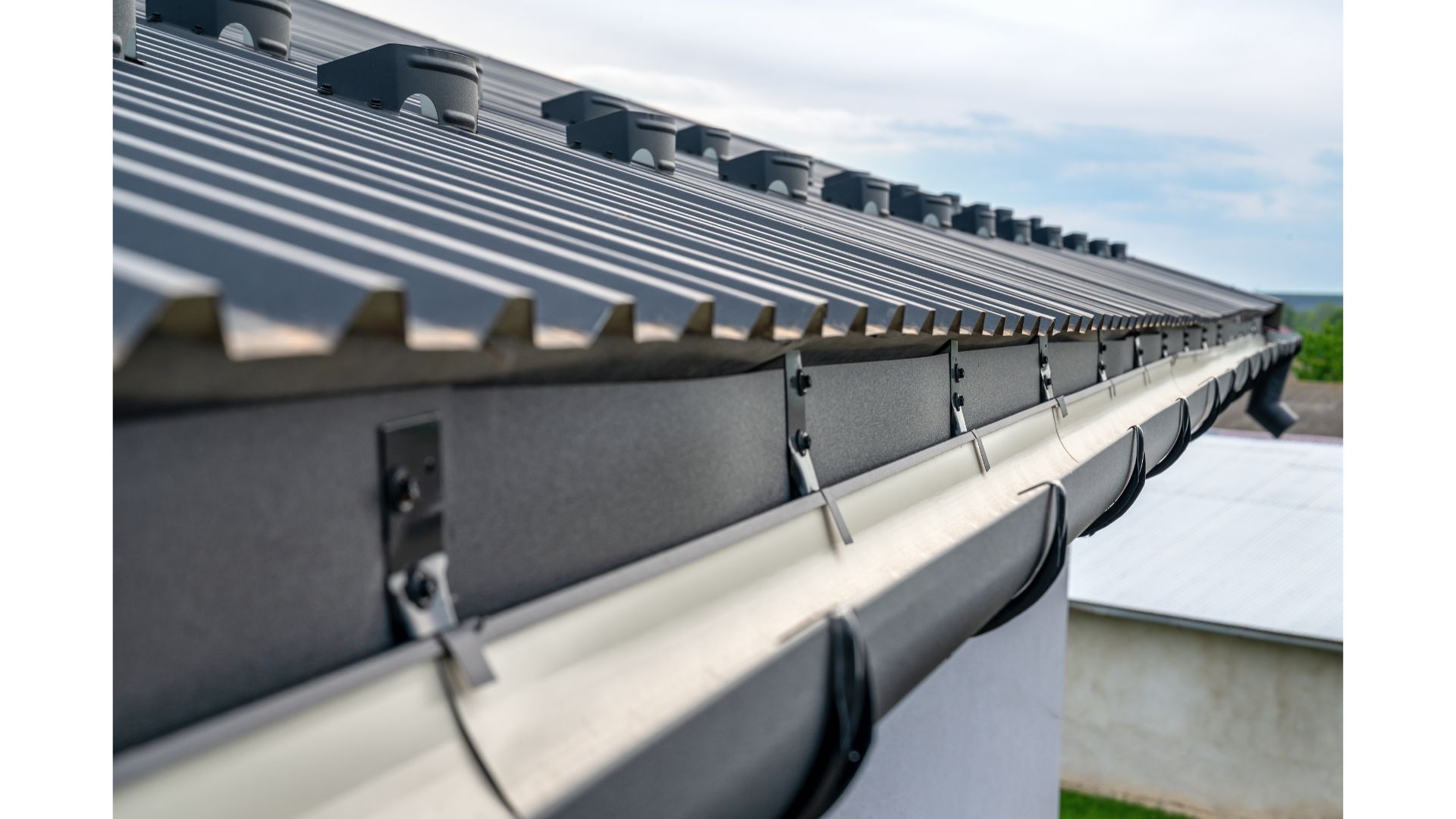
Gutter Lifespan: How Many Years Will Gutters Last?
Understanding the lifespan of your gutters is crucial in maintaining the structural integrity of your home. Properly functioning gutters are your home’s first line of defense against water damage, directing rainwater away from your home’s foundation, protecting your roofing, and preventing soil erosion around your property. In this blog, we will delve into the lifespan of various types of gutters, the factors influencing their durability, and how to extend their longevity.
Types of Gutters and Their Lifespans
Different materials used in gutters contribute to their varying lifespan:
- Aluminum Gutters: As the most common type of gutter, aluminum is lightweight, resistant to rust, and easy to install. When maintained correctly, aluminum gutters can last around 20 to 30 years.
- Vinyl Gutters: Vinyl, another popular choice, is affordable and resilient against rust and rot. However, they are susceptible to cracks in colder climates and can become brittle with age. Typically, vinyl gutters have a lifespan of around 10 to 15 years.
- Steel Gutters: Steel gutters are robust and highly durable. However, they are prone to rust over time, which can shorten their lifespan. On average, steel gutters can last up to 20 years.
- Copper Gutters: Known for their durability and aesthetic appeal, copper gutters can last as long as 50 years. They naturally resist rust, but they are more expensive than other options.
Factors Affecting Gutter Lifespan
Several factors can influence the longevity of your gutters:
- Weather Conditions: Areas with extreme weather conditions, such as heavy snowfall or intense heat, can reduce your gutters’ lifespan. Harsh weather can lead to wear and tear, warping, and other damage.
- Maintenance: Regular cleaning and maintenance are crucial in extending your gutter’s lifespan. Neglecting maintenance can lead to clogs, leaks, and overflow, which can damage the gutters.
- Material Quality: The quality of the material used in your gutter system will significantly influence its lifespan. Higher quality materials tend to last longer, but they may also come with a higher price tag.
- Installation: Improper installation can severely reduce the lifespan of your gutters. Hiring professional installers can ensure your gutters are installed correctly, extending their life and preventing issues down the line.
Extending Your Gutter’s Lifespan
Proper maintenance and care are key to getting the most out of your gutter system:
- Regular Cleaning: Clean your gutters at least twice a year to remove leaves, twigs, and other debris. Clogged gutters can lead to water overflow, which can damage your gutters and home.
- Gutter Guards: Gutter guards can prevent debris from clogging your gutters, reducing maintenance needs and extending their lifespan.
- Regular Inspections: Conduct regular inspections for signs of leaks, rust, and other damage. Early detection and repair can prevent further damage and prolong your gutters’ life.
- Professional Maintenance: Consider hiring professionals for periodic maintenance. They can spot issues you may miss and can perform necessary repairs to extend the gutters’ lifespan.
While the type of gutter you have will significantly influence how long it will last, your gutters’ lifespan will largely depend on how well you maintain them. Regular cleaning and inspections, along with prompt repairs, will ensure your gutters protect your home for many years to come.

What is the Purpose of Gutters?
Gutters play a significant role in maintaining the structural integrity of your home. They serve as the primary component of your home’s drainage system, directing water away from the building to prevent damage. Despite being often overlooked, understanding the purpose of gutters can save homeowners from costly repairs in the future.
- Protecting the Foundation: The best way to prevent water damage to your home’s foundation is to install a reliable gutter system. Gutters collect rainwater from the roof and direct it away from the base of your house. Without gutters, water would pour off your roof, pooling around the foundation, which can lead to severe structural damage over time.
- Preventing Soil Erosion: By directing rainwater away from your home, gutters also play a significant role in preventing soil erosion around your property. Soil erosion can lead to landscape damage and even destabilize your home’s foundation.
- Preventing Siding Damage: Water pouring off your roof can splash dirt onto your home’s siding, causing it to deteriorate or discolor over time. Gutters collect this water and channel it safely to the ground, protecting your siding from potential damage.
- Preventing Basement Flooding: Without gutters, water can seep into your basement, leading to flooding and moisture-related issues such as mold and mildew growth. Gutters channel water away from your home, preventing it from pooling around your foundation and leaking into your basement.
- Protecting Doors and Windows: Water dripping from the edges of the roof can cause damage to doors, windows, and other exterior features of your house. Installing gutters is an effective way to prevent this type of damage.
To keep your gutter system functioning properly, consider installing accessories such as leaf guards. Leaf guards help prevent blockages in your gutters by stopping leaves and other debris from entering the system while allowing water to flow freely. Understanding the purpose and importance of gutters can help homeowners appreciate their significance in home maintenance and why it is vital to keep them in good working condition. Regular inspections and cleaning of your gutters are an integral part of this process.
Pros and Cons of Popular Gutter Materials
Different gutter materials come with their own sets of advantages and disadvantages. Let’s take a closer look at some of the most commonly used gutter materials.
Aluminum Gutters
Pros:
- Lightweight and easy to install.
- Available in various colors and can be painted to match your exterior.
- Resistant to rust and generally lasts up to 30 years.
Cons:
- Prone to dents and damage from severe weather or falling branches.
- Over time, they can leak at the seams where sections join.
Vinyl Gutters
Pros:
- Resistant to rust and rot.
- Lightweight, making them easy to install.
- Affordable and ideal for those on a tight budget.
Cons:
- Can become brittle and crack in extreme cold or age.
- The color may fade over time due to UV exposure.
- Typically have a shorter lifespan of around 10-15 years.
Steel Gutters
Pros:
- Highly durable and sturdy.
- Can handle a lot of weight, making them ideal for areas with heavy snowfall.
Cons:
- More prone to rust than other materials.
- Heavier than aluminum or vinyl, making them more challenging to install.
- Generally more expensive due to their durability.
Copper Gutters
Pros:
- Exceptionally durable with a lifespan up to 50 years.
- Requires less maintenance than other gutter materials.
- Develops a patina over time, adding a unique aesthetic appeal.
Cons:
- Much more expensive than other gutter materials.
- Requires professional installation due to the need for soldering joints.
The best material for your gutters will depend on your specific needs, the climate in your area, and your budget. Understanding the pros and cons of each can help you make an informed decision. It’s also worth consulting with a gutter professional to discuss the best options for your home.

Does the Gutter Style You Choose Affect the Lifespan?
When considering your home’s gutters, it’s essential to think beyond just the material. The style of your gutter can also have a significant impact on its lifespan. Here are a few of the most popular gutter styles and how they can affect longevity.
Seamless Gutters
Seamless gutters are made to measure and customized to fit your home perfectly. They have fewer joints and seams, meaning there’s less chance for leaks to develop. As a result, they typically last longer than sectional gutters.
Pros:
- Fewer leaks: With fewer seams, seamless gutters are less likely to have leaks and related water damage.
- Custom fit: The gutters are made to fit your house specifically, which can enhance their effectiveness and longevity.
- Low maintenance: Less debris gets caught up in the gutters, which means you’ll need to clean them less frequently.
Cons:
- Cost: Seamless gutters are often more expensive initially due to the custom manufacturing process.
- Installation: They require professional installation, which may add to the cost.
Half-Round Gutters
As the name suggests, half-round gutters are shaped like a half-circle. They’re a traditional style often found on older or historic homes.
Pros:
- Aesthetics: Half-round gutters have a unique look that can add a touch of elegance to your home.
- Less clogging: Their smooth shape allows water and debris to flow more freely, reducing the chances of clogging.
Cons:
- Capacity: They typically hold less water than K-style gutters, which could be an issue in areas with heavy rainfall.
- Cost: These gutters tend to be more expensive and may require special hangers, adding to the cost.
Long Gutters
Long gutters are typically used for commercial or large residential buildings. They have a high capacity for handling water, making them ideal for big roofs.
Pros:
- Capacity: These gutters can handle a larger volume of water, reducing the risk of overflow.
- Fewer seams: Due to their length, they require fewer seams, reducing potential leak points.
Cons:
- Installation: Long gutters can be challenging to install and may require professional assistance.
- Cost: They are typically more expensive due to their size and installation complexity.
While the style of gutter you choose can influence its lifespan, there’s more to consider. The material of the gutter, the quality of installation, and how well the gutters are maintained all play a critical role in how long your gutters will last.
Understanding Proper Gutter Maintenance
Keeping your gutters in good condition is not just about choosing the right material or style; it’s also about carrying out regular maintenance. By properly maintaining your rain gutters, you can significantly extend their lifespan and keep them functioning optimally. Below are some key tips on how to properly maintain your gutters.
Cleaning
Regular cleaning is crucial for your gutters’ longevity. This involves removing debris such as leaves, sticks, and dirt that can accumulate over time, causing blockages. Depending on your location and the number of trees near your house, you may need to clean your gutters at least twice a year – once in the spring and once in the fall.
Inspection
Make it a habit to inspect your gutters for any signs of damage. Look out for cracks, holes, rust, and any signs of separation from the house. Regular inspections can help you spot small issues before they turn into significant problems.
Repairs
If you find any damage during your inspections, make sure to carry out the necessary gutter repairs as soon as possible. This could be as simple as patching a small hole or as complex as replacing a large section of your gutters.
Downspout Check
Don’t forget to check your downspouts. Ensure they’re diverting water away from your home’s foundation as intended. If water pools around the base of your house, it can lead to significant foundation problems.
Professional Help
If your gutters are in bad shape or you’re uncomfortable doing the maintenance yourself, consider hiring a professional. Professionals have the necessary tools and expertise to keep your gutters in top condition and can provide you with valuable advice on maintaining your specific type of gutter.
By adhering to a regular maintenance schedule and being proactive with gutter repairs, you can help your rain gutters last longer, save money in the long run, and protect your home from potential water damage. It’s always better to address issues early rather than deal with the consequences of neglected gutters.

Breaking Down the Cost of Gutter Installation
Whether you’re replacing old gutters or installing new ones for the first time, understanding the cost involved is crucial for your budgeting process. The total price of gutter installation can vary based on a few factors including the type of gutter material you choose, the size of your house, and labor costs.
- Gutter Material: The material of the gutters is often the biggest cost factor. Here are some average prices for popular gutter materials as of 2023:
- Aluminum Gutters: These are the most common type of gutters used today. They’re lightweight, rust-resistant, and relatively easy to install. The cost typically ranges from $6 to $12 per linear foot.
- Vinyl Gutters: Vinyl is another popular choice due to its affordability and ease of installation. They can cost anywhere from $3 to $5 per linear foot. However, they might not be as durable as other options, especially in extreme weather conditions.
- Copper Gutters: Copper gutters are incredibly durable and offer a unique aesthetic, but they are more expensive. They can cost anywhere from $15 to $25 per linear foot.
- Steel Gutters: Steel gutters are durable and can withstand heavy weights, making them a good option for areas with heavy rainfall or snow. The cost is generally between $8 to $10 per linear foot.
- Labor Costs: The labor costs for gutter installation will vary depending on your location and the complexity of the installation. On average, labor costs can range from $50 to $250 per job. If you’re hiring a professional for the task, be sure to ask for an itemized quote that breaks down all the costs involved.
- Size of Your House: The total linear feet of gutters needed will also affect the total cost. A larger house will require more gutters, increasing the total price.
- Additional Costs: Don’t forget to factor in any additional costs that might occur, such as removing and disposing of old gutters, modifying soffits and fascia, or installing gutter guards.
Remember, investing in quality new gutters and professional installation can save you money in the long run by reducing the need for constant repairs and premature replacement. Always consider the quality and durability of materials, as well as the reputation and experience of your chosen gutter installation company.
The Essential Role of Gutters and Influencing Factors for Lifespan
Gutters are an essential part of your home’s exterior. They channel away the rainwater from your roof, protecting your home’s foundation, preventing erosion, and protecting your landscaping. However, much water can be directed by your gutters during a year, especially during the rainy season. This places a significant amount of wear and tear on your gutters over time.
Understanding the average life expectancy of gutters and the different factors that can impact it can help you plan ahead for maintenance, repairs, or replacements.
- Material Durability: As discussed earlier, the material of your gutters significantly affects their lifespan. Aluminum and copper gutters tend to last longer due to their durability and resistance to the elements.
- Maintenance: Regular maintenance can greatly extend the lifespan of your gutters. This includes cleaning out debris, checking for and fixing leaks, and ensuring that they’re properly aligned and attached to your house.
- Climate: The weather and climate in your area can affect the average lifespan of your gutters. Regions with heavy rainfall or snowfall can place more strain on gutters, potentially leading to a shorter lifespan.
- Roof Size and Pitch: The size and pitch of your roof can affect how much water is channeled into your gutters. Larger roofs or roofs with a steeper pitch may channel more water into gutters, potentially leading to more wear and tear over time.
- Tree Coverage: If you have many trees close to your house, your gutters may fill up with leaves and debris more quickly. This can cause blockages and damage if not regularly cleaned out.
Understanding these factors can help you get a better idea of when your gutters might need replacing. On average, well-maintained aluminum gutters can last about 20 years, while copper gutters can last up to 50 years if properly cared for. However, it’s important to note that these are average lifespans, and the actual lifespan of your gutters can vary based on these different factors. It’s always a good idea to regularly inspect your gutters and consult with a professional if you notice any signs of serious wear or damage. If your gutters are nearing the end of their average lifespan, it may be a good idea to have them inspected and consider a replacement.

Top 10 Gutter Brands of 2023
There are many reputable brands that manufacture high-quality gutters. Here are the top 10 gutter brands of 2023 that are currently leading the market.
- LeafGuard: Known for its patented one-piece, seamless, leaf-shedding design, LeafGuard offers an effective and attractive solution for homes. Their system prevents clogs and ensures efficient water flow.
- Rain Chains Direct: Rain Chains Direct offers a stylish alternative to traditional gutter downspouts, with beautiful, durable products that transform the appearance of your home.
- Amerimax Home Products: Amerimax offers a wide range of gutter systems in different materials, including aluminum, vinyl, and steel. They are also known for their high-quality gutter guards.
- Gutterglove: Gutterglove offers some of the most reliable gutter guards in the market. Their guards are designed to filter out debris to keep your gutters flowing freely.
- Guttersupply.com: Guttersupply.com provides a vast selection of gutter systems, parts, and accessories. They offer seamless gutter systems in aluminum and copper.
- E-Z Gutter: E-Z Gutter is known for their gutter guards that are easy to install and provide robust leaf and debris protection.
- FlexxPoint Gutter Cover Systems: FlexxPoint offers gutter covers that prevent clogs and extend the life of your gutters. Their 30-year warranty is hard to beat.
- Spectra Metals: Spectra Metals offers a variety of gutter parts and accessories. They are best known for their aluminum K-style gutter system.
- Genova Products: Genova offers a line of vinyl gutter systems that are lightweight, easy to install, and require minimal maintenance.
- Klauer Manufacturing Company: With more than a century of expertise, Klauer manufactures steel and aluminum gutter components known for their durability and performance.
Remember that the best brand for you will depend on your specific needs, including your home’s design, the local climate, and your budget. Always consult with a professional before deciding on the brand and type of gutters for your home.
Gutter Guards: Are They Important?
Now that you understand the importance of gutters in protecting your home, it’s time to take a closer look at gutter guards and their role in maintaining a functional gutter system. Gutter guards, also known as gutter covers or leaf guards, are accessories designed to prevent debris from entering your gutters while allowing water to flow freely. Here’s why gutter guards are important:
- Preventing Clogs: Gutter guards are an effective solution to prevent debris, such as leaves, twigs, and pine needles, from accumulating in your gutters. By keeping these materials out, gutter guards help prevent clogs that can obstruct water flow and cause potential damage to your gutters and home.
- Reducing Maintenance: Without gutter guards, regular gutter cleaning can be a tedious and time-consuming task. Gutter guards significantly reduce the frequency of cleaning by minimizing the amount of debris that enters your gutters. While occasional maintenance may still be required, it will be less frequent and more manageable.
- Preventing Water Damage: Clogged gutters can lead to water overflow, causing water to spill over the sides and potentially damage your home’s exterior, foundation, and landscaping. Gutter guards ensure that water flows freely through your gutters, reducing the risk of water damage.
- Minimizing Pest Infestations: Clogged gutters can become an inviting environment for pests like mosquitoes, birds, squirrels, and rodents. Gutter guards act as a barrier, preventing debris buildup and reducing the likelihood of pests nesting or breeding in your gutters.
- Extending Gutter Lifespan: By preventing clogs and minimizing debris accumulation, gutter guards can help extend the lifespan of your gutters. Reduced exposure to moisture and debris reduces the risk of corrosion, rust, and damage, ultimately prolonging the overall durability of your gutter system.
- Preserving Water Quality: Gutter guards help keep your gutter system clean, preventing decomposing debris from entering rainwater runoff. This can help preserve the quality of water collected in rain barrels or redirected to other areas of your property.
When choosing gutter guards, consider the type that best suits your specific needs. There are various types available, including mesh screens, foam inserts, reverse curve systems, and bottle brush styles. Each type offers different levels of debris protection, ease of maintenance, and cost-effectiveness. Consulting with a professional gutter installer can help you select the most suitable option for your home.
Gutter guards are an important investment in the long-term health and efficiency of your gutter system. They provide added protection against clogs, reduce maintenance efforts, and safeguard your home from water damage. With gutter guards in place, you can enjoy peace of mind knowing that your gutters will perform optimally, effectively protecting your home for years to come.
